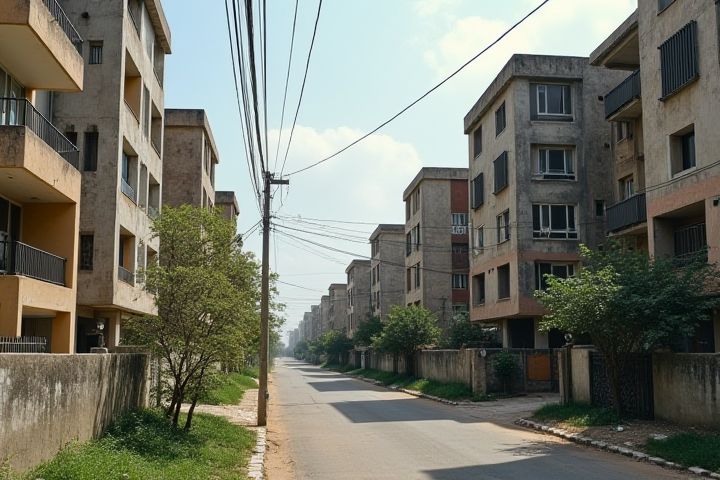
Urban development in Nigeria is characterized by rapid population growth, leading to significant expansions in cities like Lagos, Abuja, and Port Harcourt. This growth stimulates infrastructure projects, including transportation networks, housing developments, and public services, aimed at accommodating the increasing urban population. The informal economy plays a crucial role, with street vendors and small businesses contributing substantially to local economies while challenges such as inadequate sanitation and waste management persist. Sustainable urban planning is essential to addressing these issues, integrating green spaces and affordable housing to enhance the quality of life for residents. Engaging local communities in the planning process can foster a sense of ownership and ensure that development meets the needs of diverse populations.
Rapid urbanization
Rapid urbanization in Nigeria significantly influences urban development, characterized by an increase in population density and evolving infrastructure in cities like Lagos and Abuja. This transformation drives the demand for housing, transportation, and essential services, leading to both opportunities and challenges for local governments and communities. Urban planning must address issues such as traffic congestion, waste management, and access to clean water to enhance living conditions. You may observe that successful urban strategies incorporate technology and sustainable practices to create resilient urban environments that can accommodate future growth.
Overpopulation challenges
Urban development in Nigeria is significantly impacted by overpopulation challenges, with cities like Lagos experiencing rapid population growth that strains infrastructure and services. The increasing demand for housing, transportation, and healthcare has led to informal settlements and traffic congestion, highlighting the urgent need for sustainable urban planning. Government initiatives, such as the National Urban Development Policy, aim to address these issues through improved public transit systems and affordable housing projects. Investing in smart city technologies can further enhance urban resilience, ensuring that urban areas accommodate growing populations effectively.
Infrastructure deficits
Urban development in Nigeria is heavily influenced by significant infrastructure deficits, which impact transportation, health, and education systems. Many cities experience inadequate road networks, unreliable power supply, and insufficient water resources, hindering economic growth and quality of life. With rapid urbanization, addressing these deficits has become crucial for fostering sustainable development and enhancing residents' living conditions. By investing in innovative infrastructure projects, Nigeria aims to create resilient urban environments that can accommodate its growing population.
Informal settlements rise
In Nigeria, urban development is increasingly characterized by the rise of informal settlements, reflecting rapid urbanization and migration trends. These unregulated areas often lack adequate infrastructure, such as proper sanitation, electricity, and transportation, contributing to a myriad of challenges for residents. Informal settlements, often referred to as slums, house a significant portion of urban populations, providing crucial livelihoods despite their precarious conditions. Addressing the needs of these communities is essential for sustainable urban growth and improving living standards across the nation.
Environmental concerns
Urban development in Nigeria increasingly prioritizes environmental sustainability due to rapid urbanization and population growth. This focus has led to initiatives aimed at reducing pollution, preserving green spaces, and improving waste management systems in major cities like Lagos and Abuja. Local governments and organizations are implementing policies that promote eco-friendly infrastructure, such as renewable energy sources and efficient public transport networks, to mitigate the impacts of urban sprawl. You may notice community engagement programs that emphasize the importance of environmental stewardship and encourage citizens to participate in reforestation and clean-up efforts.
Smart city initiatives
Urban development in Nigeria is increasingly centered around Smart city initiatives, which aim to enhance the quality of urban life through advanced technology and sustainable practices. These initiatives incorporate smart infrastructure, efficient public transportation, and effective waste management systems that leverage data analytics to improve city operations. By integrating Internet of Things (IoT) devices, Nigerian cities can monitor traffic patterns, energy consumption, and environmental conditions, leading to a more responsive urban environment. You can witness the positive impacts of these initiatives in urban areas like Lagos, where innovative solutions are being implemented to tackle challenges such as congestion and inadequate public services.
Real estate boom
The real estate boom in Nigeria is driven by rapid urbanization, increasing population, and a growing middle class seeking modern housing solutions. Major cities like Lagos and Abuja are experiencing significant infrastructure investments, enhancing transportation, utilities, and social amenities. This surge in demand has attracted both local and international investors, fostering a competitive market for residential and commercial properties. As a result, innovative housing projects and smart city initiatives are emerging, aiming to address sustainable living and improve the quality of life for urban residents.
Transportation improvements
Urban development in Nigeria is significantly centered on enhancing transportation infrastructure, addressing the challenges of congestion and inefficiency in major cities. Key projects include the expansion of road networks, the introduction of light rail systems, and the development of bus rapid transit (BRT) lanes to facilitate smoother commutes. Improved transportation systems are crucial for economic growth, reducing travel time, and increasing accessibility for residents and businesses alike. By investing in these initiatives, Nigeria aims to create a more interconnected urban environment that promotes sustainable development and boosts the overall quality of life.
Housing affordability issues
Housing affordability in Nigeria is a pressing concern amid rapid urbanization, as many citizens face challenges accessing suitable living conditions. The government and private sector are increasingly investing in affordable housing projects to mitigate the growing demand. Innovative financing models, such as microfinance and public-private partnerships, are being explored to enhance accessibility for low-income families. Your involvement in community planning initiatives can further address these affordability issues, ensuring sustainable urban growth and improved living standards.
Government policy reforms
Urban development in Nigeria is significantly influenced by government policy reforms aimed at promoting sustainable growth and infrastructure improvement. Initiatives such as the National Urban Development Policy prioritize participatory governance, ensuring that local communities are involved in decision-making processes. Investments in transportation, housing, and public services reflect a commitment to address urban challenges, including rapid population growth and inadequate infrastructure. By fostering public-private partnerships, these reforms aim to create resilient cities that enhance the quality of life for citizens.
